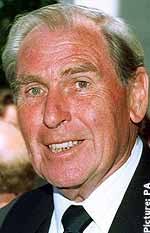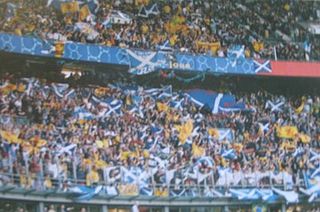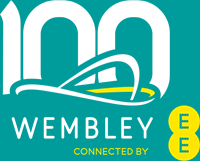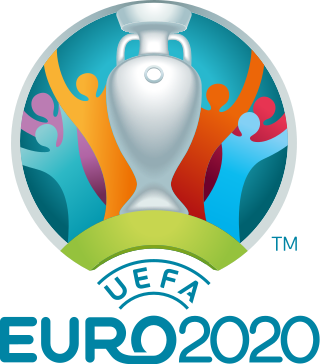
The England national football team have represented England in international football since the first international match in 1872. It is controlled by the Football Association (FA), the governing body for football in England, which is affiliated with UEFA and comes under the global jurisdiction of world football's governing body FIFA. England competes in the three major international tournaments contested by European nations: the FIFA World Cup, the UEFA European Championship and the UEFA Nations League.

Kenneth Wolstenholme, DFC & Bar was an English football commentator for BBC television in the 1950s and 1960s. He is best remembered for his commentary during the 1966 FIFA World Cup Final; in the closing minutes, Wolstenholme commented on a series of pitch invaders as Geoff Hurst dribbled down the pitch before scoring, saying "some people are on the pitch, they think it's all over!" The phrase has become deeply embedded in British popular culture. As Hurst proceeded to score, Wolstenholme added: 'It is now!'

A football chant or terrace chant is a form of vocalisation performed by supporters of association football, typically during football matches. Football chanting is an expression of collective identity, most often used by fans to express their pride in the team they support, or to encourage them, and to celebrate a particular player or manager. Fans may also use football chants to slight the opposition, and many fans sing songs about their club rivals, even when they are not playing them. Sometimes the chants are spontaneous reactions to events on the pitch.

The Scotland national football team represents Scotland in men's international football and is controlled by the Scottish Football Association. They compete in three major professional tournaments: the FIFA World Cup, UEFA Nations League, and the UEFA European Championship. Scotland, as a country of the United Kingdom, are not a member of the International Olympic Committee, and therefore the national team does not compete in the Olympic Games. The majority of Scotland's home matches are played at the national stadium, Hampden Park.

"Three Lions", commonly referred to as "It's Coming Home" or "Football's Coming Home", is a song by the English comedians David Baddiel and Frank Skinner and the rock band the Lightning Seeds. It was released on 20 May 1996 through Epic Records to mark the England football team's participation in that year's UEFA European Championship, which England was hosting.

The Tartan Army are fans of the Scotland national football team. They have won awards from several organisations for their friendly behaviour and charitable work. They have also been criticised at times for aspects of their behaviour, however, such as indecent exhibitionism and jeering at "God Save the Queen".
The England national under-21 football team, also known as England under-21s or England U21(s), is the national under-21 association football team of England, under the control of the Football Association. It is considered to be the feeder team for the England national football team.
"Glory Glory" is a terrace chant sung in association football in the United Kingdom and in other sport. It uses a popular camp meeting hymn tune of unknown origin that is famously associated with the marching song "John Brown's Body", with the chorus "Glory, Glory, Hallelujah" – the chant replaces "Hallelujah" with the name of the favoured team. The chant's popularity has caused several clubs to release their version as an official team song.
"She'll Be Coming 'Round the Mountain" is a traditional folk song often categorized as children's music. The song is derived from the Christian spiritual known as "When the Chariot Comes". It has been assigned the number 4204 in the Roud Folk Song Index.

Joleon Patrick Lescott is an English former professional footballer, coach and sports pundit. He currently works as an interim coach with the England senior team.

Martin Atkinson is an English referee coach and retired professional football referee who officiated primarily in the Premier League. He is a member of the West Riding County Football Association.

The English and German national football teams have played each other since the end of the 19th century; officially since 1930. The teams met for the first time in November 1899, when England beat Germany in four straight matches. Notable matches between England and Germany include the 1966 FIFA World Cup final, the semifinals of the 1990 FIFA World Cup, the semifinals of UEFA Euro 1996, the round of sixteen of the 2010 FIFA World Cup and UEFA Euro 2020. While the English public, football fans and in particular newspapers consider an England–Germany football rivalry to have developed, it is mostly an English phenomenon since most German fans consider the Netherlands or Italy to be their traditional footballing rivals.

The history of the England national football team, also known as the Three Lions, begins with the first representative international match in 1870 and the first officially-recognised match two years later. England primarily competed in the British Home Championship over the following decades. Although the FA had joined the international governing body of association football FIFA in 1906, the relationship with the British associations was fraught. In 1928, the British nations withdrew from FIFA, in a dispute over payments to amateur players. This meant that England did not enter the first three World Cups.

Wembley Stadium is an association football stadium in Wembley, London. It opened in 2007 on the site of the original Wembley Stadium, which had stood from 1923 until 2003. The stadium is England's national football stadium, and thus hosts the majority of the England national team home matches and the FA Cup Final – the final of England's primary domestic club football competition. It is widely regarded as one of the most iconic football stadiums in the world, and is considered a hub for the English game. Wembley Stadium is owned by the governing body of English football, the Football Association, whose headquarters are in the stadium, through its subsidiary Wembley National Stadium Ltd (WNSL). With 90,000 seats, it is the largest stadium in the UK and the second-largest stadium in Europe, behind Barcelona's Camp Nou.

The 2020 UEFA European Football Championship, commonly referred to as UEFA Euro 2020 or simply Euro 2020, was the 16th UEFA European Championship, the quadrennial international men's football championship of Europe organised by the Union of European Football Associations (UEFA). To celebrate the 60th anniversary of the European Championship competition, UEFA president Michel Platini declared that the tournament would be hosted in several nations as a "romantic" one-off event, with 11 cities in 11 UEFA countries each providing venues for the tournament, making it the second senior international tournament in history after the 2007 AFC Asian Cup to have more than two nations co-hosting it.
Concerns and controversies related to UEFA Euro 2012 covers, the themes and issues surrounding the 2012 UEFA European Football Championship in Poland and Ukraine. After Poland and Ukraine were chosen by a vote of the UEFA Executive Committee as host countries for UEFA Euro 2012, several issues arose. Preparation work proceeded more speedily in Poland than in Ukraine and, following a visit in April 2009, Michel Platini announced that all was on track and he saw no major problems. UEFA confirmed the appointment of the Polish cities of Warsaw, Poznań, Wrocław and Gdańsk. At the same meeting, an appeal for the delayed decision on the Ukrainian venues was granted to Lviv, Donetsk, and Kharkiv in order to meet specific conditions regarding infrastructure, with a warning that only Kyiv and the best prepared city of the other candidates would otherwise be used if issues were not resolved by the end of November, though it took heavy amount of time and resources
The England Band are the official supporters band of the England national football team, from Sheffield and are led by John Hemmingham. They were sponsored by Pukka Pies from 2006 until 2014.

The UEFA Euro 2020 final was an association football match that took place at Wembley Stadium in London, England, on 11 July 2021, to determine the winners of UEFA Euro 2020. It was the sixteenth final of the UEFA European Championship, a quadrennial tournament contested by the senior men's national teams of the member associations of UEFA to decide the champions of Europe. Originally scheduled for 12 July 2020, the match had been postponed along with the rest of the tournament due to the COVID-19 pandemic in Europe. The match was contested between Italy, in their fourth Euro final, and England, in their first ever Euro final, and just their second final at any major tournament, after the 1966 FIFA World Cup final.
"No Surrender (to the IRA)" is a British football chant sung to the tune of the "Oil in My Lamp" hymn which expresses opposition to the Provisional Irish Republican Army. It was commonly sung in UK pubs in the 1970s and 1980s, including by Rangers F.C. supporters, many of whom held strong unionist sentiments. It may have been adopted by English fans who switched to following Scottish football clubs (including Rangers F.C.) during the five-year period that English clubs were banned from competing in UEFA competitions following the 1985 Heysel Stadium disaster. By the 21st century, the song has become controversial in both the UK and Ireland. In 2013, The Football Association of England emailed supporters, asking them to refrain from singing it ahead of a May 2013 game against the Republic of Ireland national football team.

The UEFA Women's Euro 2022 final was a football match on 31 July 2022 that took place at Wembley Stadium in London, England, to determine the winner of UEFA Women's Euro 2022. The match was contested between hosts England, who won, and Germany.














